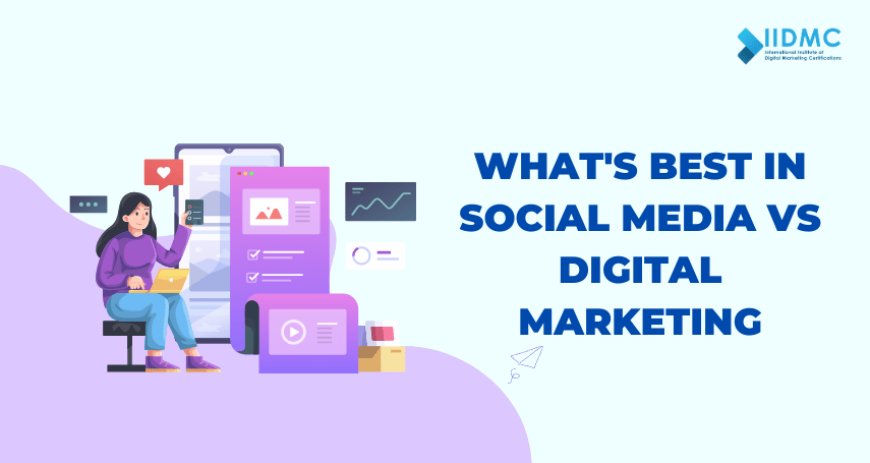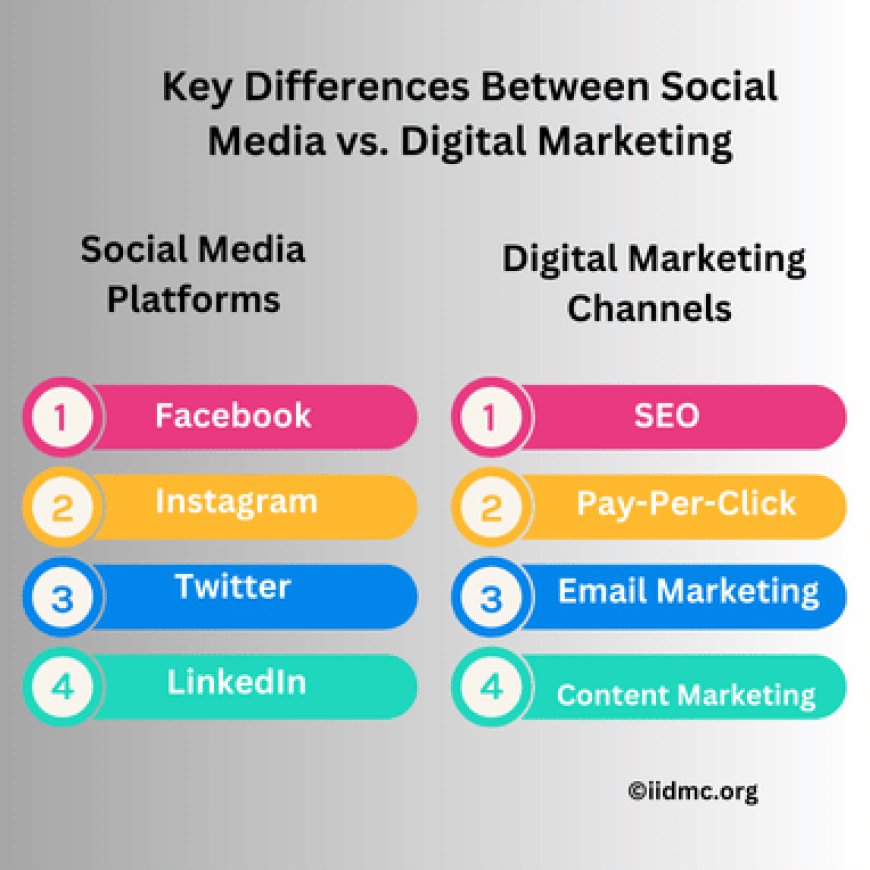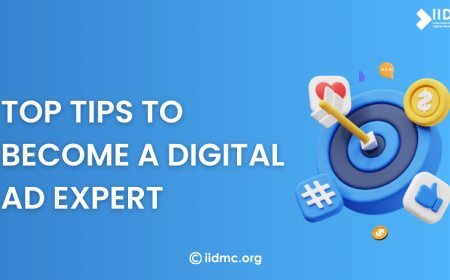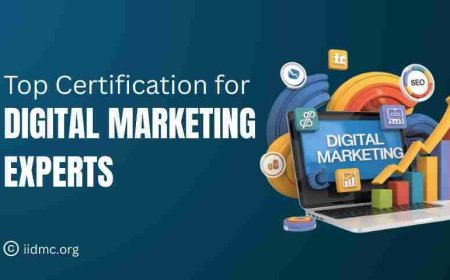What's Best in Social Media vs Digital Marketing
Discover the key differences between social media and digital marketing, and learn which strategy is best for your business by exploring their unique benefits, tools, and approaches.

The terms "social media" and "digital marketing" are often used alternatively, yet they include distinct strategies and objectives. As businesses navigate the complexities of online engagement, understanding the details between these two approaches becomes crucial. Social media platforms offer unique opportunities for building community and growing direct interaction with audiences, while digital marketing encompasses a broader spectrum, including search engine optimization (SEO), email campaigns, and content marketing. But which is the best strategy for your business? In this blog post, we’ll explore the key differences, advantages, and potential drawbacks of both social media and digital marketing to help you determine the right approach for your brand's unique needs and goals. Join us as we dive into the complexities of these two powerful tools and discover how to use them effectively for maximum impact.
Social Media Marketing
Social media marketing involves promoting products or brands through platforms like Facebook, Instagram, Twitter, and LinkedIn. It focuses on creating engaging content to build brand awareness, foster community interaction, and drive traffic to websites, ultimately converting followers into customers.
Digital Marketing
Digital marketing encompasses a broader range of online strategies aimed at connecting with consumers. This includes social media marketing, search engine optimization (SEO), pay-per-click (PPC) advertising, email marketing, and content marketing. The goal is to engage potential customers throughout their buying journey using data-driven insights to optimize campaigns.
Key Differences Between Social Media vs. Digital Marketing

Channels Used
Social Media Platforms
-
Facebook: Ideal for diverse demographics, allowing targeted ads and community engagement.
-
Instagram: Focuses on visual content for product showcasing through photos and videos.
-
Twitter: Enables real-time communication and participation in trending conversations.
-
LinkedIn: Best for B2B marketing and connecting with professionals.
Broader Digital Marketing Channels
-
Search Engine Optimization (SEO): Enhances website visibility in search results.
-
Pay-Per-Click (PPC) Advertising: Drives targeted traffic through paid ads.
-
Email Marketing: Communicates directly with customers via newsletters and promotions.
-
Content Marketing: Creates valuable content to attract and retain audiences.
-
Affiliate Marketing: Rewards affiliates for driving traffic or sales.
Understanding these channels helps businesses effectively allocate resources and develop tailored strategies.
Pros and Cons
Advantages of Social Media Marketing
-
Real-time Engagement and Feedback: Social media allows brands to interact with customers instantly, fostering a sense of community and enabling quick responses to inquiries or concerns.
-
Cost-effectiveness for Brand Visibility: Setting up social media accounts is free, and paid advertising can be tailored to fit various budgets, making it accessible for businesses of all sizes to increase their visibility.
Advantages of Digital Marketing
-
Comprehensive Reach and Targeting: Digital marketing strategies, such as SEO and PPC, can reach a global audience while targeting specific demographics based on user behavior, interests, and preferences.
-
Versatility in Campaign Types: Digital marketing encompasses a wide range of campaign types, including content marketing, email campaigns, and paid advertising, allowing for a multi-faceted approach to engagement and conversion.
Challenges of Each Approach
-
Social Media Challenges: Algorithm changes can affect organic reach and engagement, while reliance on specific platforms can limit control over audience interaction and brand messaging.
-
Digital Marketing Challenges: High competition in the digital space can make it challenging to stand out, and the complexity of managing multiple strategies may overwhelm businesses, requiring specialized knowledge and resources.
Best Use Cases
Situations Where Social Media Marketing Shines
-
Brand Loyalty: Social media is excellent for building strong relationships with customers. By engaging with followers through comments, shares, and personalized content, brands can foster loyalty and create a community around their products or services.
-
Community Engagement: Social media platforms allow businesses to create and nurture communities. This can be particularly effective for brands in niches such as lifestyle, health, or hobbies, where user-generated content and interactions enhance brand perception and customer involvement.
Scenarios Where Digital Marketing is More Effective
-
Lead Generation: Digital marketing excels in capturing leads through targeted ads, landing pages, and optimized content strategies. Techniques such as email marketing and PPC campaigns effectively convert prospects into customers by nurturing leads throughout their journey.
-
Detailed Analytics: Digital marketing provides comprehensive data insights that allow businesses to track campaign performance, customer behavior, and ROI. This data-driven approach enables continuous optimization of marketing strategies for better results.
Integrating Both Strategies
Importance of a Holistic Marketing Strategy
Integrating social media and digital marketing creates a harmonious marketing strategy that's the strengths of both approaches. A comprehensive strategy ensures that branding messages are consistent across platforms, enhances audience reach, and allows for more effective resource allocation. By combining the community engagement of social media with the analytical insights of digital marketing, businesses can create more personalized and impactful campaigns.
Examples of Successful Integration
-
Coca-Cola's "Share a Coke" Campaign: This campaign encouraged consumers to share photos of personalized Coke bottles on social media, improving engagement while also utilizing digital marketing strategies to reach a broader audience through targeted ads and SEO-optimized content.
-
Nike's "Just Do It" Campaign: Nike effectively integrates social media and digital marketing by using social platforms to engage customers through inspirational content, while also utilizing email marketing and PPC ads to promote specific products and events, tracking success through detailed analytics.
By effectively combining these strategies, brands can create a robust marketing ecosystem that enhances customer engagement and drives measurable results.
It's essential to understand the differences between social media marketing and digital marketing. Social media marketing shines in building brand loyalty and growing real-time engagement with customers, while digital marketing provides a broader reach and detailed analytics for lead generation. Each approach has its own advantages and challenges, so it's crucial to identify which aligns best with your career goals.
As you evaluate your marketing strategies, consider your specific needs and available resources. A balanced integration of both social media and digital marketing can enhance your overall impact. For more guidance and customized insights, check out IIDMC (International Institute of Digital Marketing & Communications), which offers valuable resources to help you navigate the world of online marketing effectively.





























